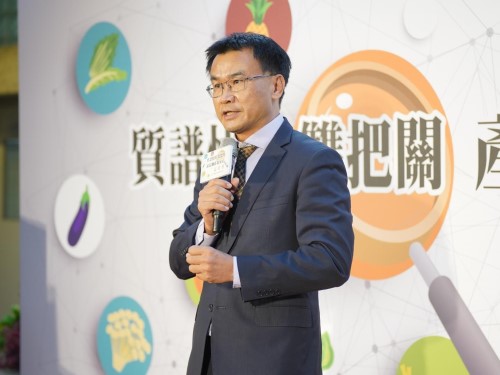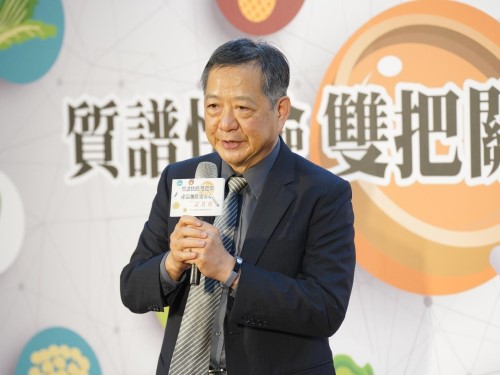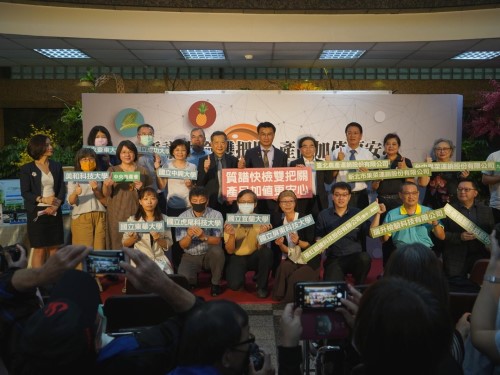News
Double controls with mass spectrometry rapid testing; products to gain value-added through safety
The mass spectrometry rapid testing technology for pesticide residues developed by the Taiwan Agricultural Chemicals and Toxic Substances Research Institute (TACTRI) of the Council of Agriculture (COA) of the Executive Yuan is a world-leading technology being applied in pre-harvest in-the-fields testing of agricultural products. Only products that pass the tests are allowed onto the market, allowing products to gain value-added through safety. In addition, mass spectrometry rapid testing technology is also being expanded for use in large-scale fruit and vegetable wholesale markets prior to auction sales. Products that do not meet standards are destroyed on the spot, and their origin is traced so that supply can be halted, thereby comprehensively protecting consumer health and safety. The latest mass spectrometry rapid testing technology issued by TACTRI is the fastest such technology in the world for testing for pesticide residues. It integrates the FaPEx pesticide fast extraction technology developed by TACTRI with mass spectrometry artificial intelligence algorithm technology, and has already received a patent in many countries. A test report can be completed within 25 minutes for the first sample, with an average of one test report every ten minutes starting from the second sample. It can simultaneously test for 198 different types of pesticides monitored in Taiwan over the past three years. This pesticide residue testing technology is environmentally friendly, fast, and accurate, and reduces testing costs from the former level of NT$4,000-6,000 per sample to NT$800-1,200 per sample, reducing testing costs for farmers and businesses and making them more willing to do self-management of pesticide residues.

The COA states that in addition to continuing to promote premium certified agriproducts such as those with “Organic” or “Traceable Agricultural Product” labels, in order to strengthen source management of products with traceability QR Codes or that are not covered by the “Three Labels and One QR Code,” it will use mass spectrometry rapid testing technology to immediately produce highly accurate test reports. After successful trials at the Taipei Agricultural Products Marketing Corporation (TAPMC), the COA has guided 17 government and private organizations in setting up laboratories for mass spectrometry rapid testing for pesticide residues, including nine at regional testing centers, four at large-scale fruit and vegetable markets, and four run privately or by juridical persons. These will undertake pre-harvest testing of crops in the fields as well as pre-auction testing in large fruit and vegetable wholesale markets. In addition, in 2020 the COA’s Agriculture and Food Agency (AFA) launched the “Crop Mass Spectrometry Rapid Testing Program,” under which it has provided 20,000 sample tests for farmers acting on their own initiative to manage pesticide residues. Tests are completed before the crops are harvested, with those meeting food safety and hygiene standards being harvested and sold on the market, while those that fail to meet these standards have harvesting postponed or are excluded from the market, and each District Agricultural Research and Extension Station (DARES) guides farmers whose products were not up to standards to use pesticides safely and legally on a case-by-case basis. In addition, the COA has been guiding farmers’ organizations to start up mass spectrometry rapid testing value-added plans, using a model of testing before harvesting and marketing afterwards. Products that meet standards following rapid testing can be differentiated using special boxes for packaging or through use of special labels, thereby encouraging sales outlets to pro-actively raise the sale price of agriproducts that have passed the rapid testing barrier.

In addition, the COA has already guided organizations including the TAPMC, the New Taipei City Fruit and Vegetable Marketing Company, and the Taichung Fruit and Vegetable Marketing Company, to set up mass spectrometry rapid testing laboratories, and has continued to expand locations for the use of these tests. In coordination with the real-name system, sample testing is conducted each day before auctioning, and products that are not up to standards are destroyed on the spot and their source is traced to stop supply, with the aim of creating an agricultural safety management model that uses tracing all the way back to the source. Take for example the comprehensive testing of celery brought to the TAPMC for auction in July of 2020. Through real-name traceability management coordinated with a mechanism for destruction of agriproducts that did not meet standards, as well as controls and guidance measures conducted in production areas by the AFA, TACTRI, and various DARES, the rate at which celery brought to the TAPMC for sale failed to meet standards fell from 20% to 0-5%. In the future the COA will integrate artificial intelligence and communications and information technology to build up a database of pesticide use by farmers, in order to rapidly identify farmers with high-risk usage of pesticides.
The COA states that in the future it will continue to expand the use of mass spectrometry rapid testing technology to other fruit and vegetable wholesale markets, in order to test agriproducts prior to sale and effectively block products that are not up to standards from reaching the market, thereby using a world-leading innovative method to comprehensively ensure food safety.

List of laboratories for mass spectrometry rapid testing for pesticide residues
|
City or county |
Testing organization |
Date of initial implementation |
Type |
|
Taipei City |
Taipei Agricultural Products Marketing Corporation |
September 21, 2019 |
Wholesale market |
|
New Taipei City |
Liu-Kung Agriculture Foundation, Taipei |
November 15, 2019 |
Regional testing center |
|
JTTEC Service Corporation |
March 19, 2020 |
Private organization |
|
|
New Taipei City Fruit and Vegetable Marketing Company |
(expected to start in October, 2020) |
Wholesale market |
|
|
Taichung City |
Swiss Testing Company |
September 27, 2019 |
Private organization |
|
National Chung Hsing University(Pesticide Residue Analysis Center) |
March 31, 2020 |
Regional testing center |
|
|
Hyper Quantum Technologies, Ltd. |
October 8, 2019 |
Private organization |
|
|
Taichung Fruit and Vegetable Marketing Company |
(expected to start in January, 2021) |
Wholesale market |
|
|
Yunlin County |
|
January 14, 2020 |
Regional testing center |
|
Tainan City |
National Cheng Kung University (Sustainable Environment Research Laboratories) |
November 7, 2019 |
Regional testing center |
|
Pingtung County |
National Pingtung University of Science and Technology (Center for Agricultural and Aquacultural Product Inspection and Certification) |
November 12, 2019 |
Regional Testing Center |
|
National Animal Industry Foundation (Technical Service Center) |
July 1, 2019 |
Juridical person |
|
|
Jiuru Fruit and Vegetable Wholesale Market |
December 17, 2019 |
Wholesale market |
|
|
Meiho University (Agricultural and Aquacultural Products Analysis Service Center) |
January 14, 2020 |
Regional testing center |
|
|
Yilan County |
National Ilan University (Center of Analysis and Technology Extension for Bio-products) |
April 1, 2020 |
Regional testing center |
|
Hualien County |
National Dong Hwa University (Eastern Taiwan Center for Pesticide and Toxic Substance Analysis) |
September 10, 2019 |
Regional testing center |
|
Taitung County |
National Taitung University (Agricultural Products Inspection Center) |
March 30, 2020 |
Regional testing center |
